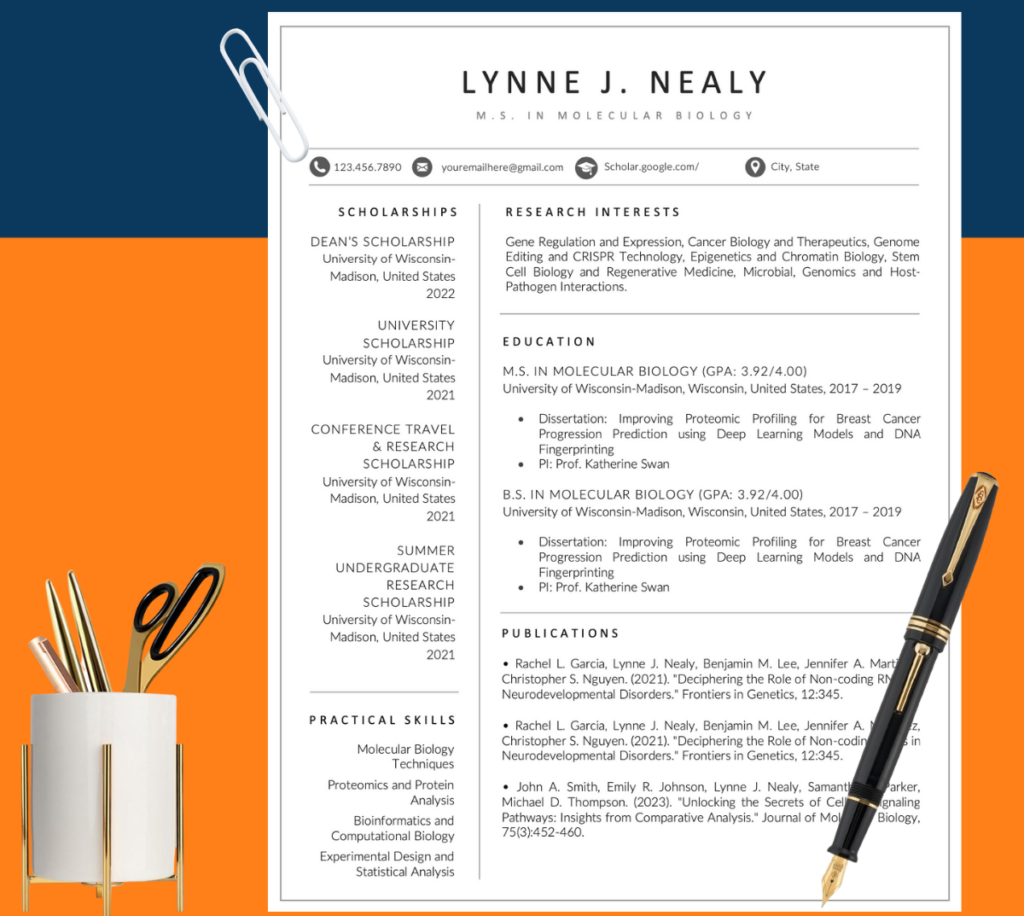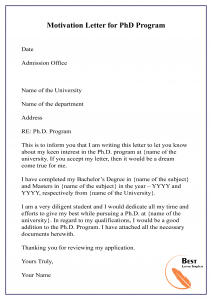

How to Write a PhD Motivation Letter
- Applying to a PhD
A PhD motivation letter is a document that describes your personal motivation and competence for a particular research project. It is usually submitted together with your academic CV to provide admissions staff with more information about you as an individual, to help them decide whether or not you are the ideal candidate for a research project.
A motivation letter has many similarities to a cover letter and a personal statement, and institutions will not ask you to submit all of these. However, it is a unique document and you should treat it as such. In the context of supporting a PhD application, the difference is nuanced; all three documents outline your suitability for PhD study. However, compared to a cover letter and personal statement, a motivation letter places more emphasis on your motivation for wanting to pursue the particular PhD position you are applying for.
Academic cover letters are more common in UK universities, while motivation letters are more common abroad.
A motivation letter can play a key part in the application process . It allows the admission committee to review a group of PhD applicants with similar academic backgrounds and select the ideal candidate based on their motivations for applying.
For admission staff, academic qualifications alone are not enough to indicate whether a student will be successful in their doctorate. In this sense, a motivational letter will allow them to judge your passion for the field of study, commitment to research and suitability for the programme, all of which better enables them to evaluate your potential.
How Should I Structure My Motivation Letter?
A strong motivation letter for PhD applications will include:
- A concise introduction stating which programme you are applying for,
- Your academic background and professional work experience,
- Any key skills you possess and what makes you the ideal candidate,
- Your interest and motivation for applying,
- Concluding remarks and thanks.
This is a simplistic breakdown of what can be a very complicated document.
However, writing to the above structure will ensure you keep your letter of motivation concise and relevant to the position you are applying for. Remember, the aim of your letter is to show your enthusiasm and that you’re committed and well suited for the programme.
To help you write a motivation letter for a PhD application, we have outlined what to include in the start, main body, and closing sections.
How to Start a Motivation Letter
Introduction: Start with a brief introduction in which you clearly state your intention to apply for a particular programme. Think of this as describing what the document is to a stranger.
Education: State what you have studied and where. Your higher education will be your most important educational experience, so focus on this. Highlight any relevant modules you undertook as part of your studies that are relevant to the programme you are applying for. You should also mention how your studies have influenced your decision to pursue a PhD project, especially if it is in the same field you are currently applying to.
Work experience: Next summarise your professional work experience. Remember, you will likely be asked to submit your academic CV along with your motivation letter, so keep this section brief to avoid any unnecessary repetition. Include any other relevant experiences, such as teaching roles, non-academic experience, or charity work which demonstrates skills or shows your suitability for the research project and in becoming a PhD student.
Key skills: Outline your key skills. Remember the admissions committee is considering your suitability for the specific programme you are applying for, so mention skills relevant to the PhD course.
Motivation for applying: Show your enthusiasm and passion for the subject, and describe your long-term aspirations. Start with how you first became interested in the field, and how your interest has grown since. You should also mention anything else you have done which helps demonstrate your interest in your proposed research topic, for example:
- Have you attended any workshops or seminars?
- Do you have any research experience?
- Have you taught yourself any aspects of the subject?
- Have you read any literature within the research area?
Finally, describe what has convinced you to dedicate the next 3-4 years (assuming you are to study full time) of your life to research.
How to End a Motivation Letter
Concluding the motivation letter is where most people struggle. Typically, people can easily describe their academic background and why they want to study, but convincing the reader they are the best candidate for the PhD programme is often more challenging.
The concluding remarks of your motivation letter should highlight the impacts of your proposed research, in particular: the new contributions it will make to your field, the benefits it will have on society and how it fits in with your aspirations.
With this, conclude with your career goals. For example, do you want to pursue an academic career or become a researcher for a private organisation? Doing so will show you have put a lot of thought into your decision.
Remember, admissions into a PhD degree is very competitive, and supervisors invest a lot of time into mentoring their students. Therefore, supervisors naturally favour those who show the most dedication. Your conclusion should remind the reader that you are not only passionate about the research project, but that the university will benefit from having you.
Finally, thank the reader for considering your application.
Finding a PhD has never been this easy – search for a PhD by keyword, location or academic area of interest.
Motivation Letter Format
There are some basic rules to follow when writing a successful motivation letter. These will mimic the standard format for report writing that the supervisor will be familiar with:
- Use a sans serif font (e.g. Arial or Times New Roman),
- Use a standard font size (e.g. 12pt) and black font colour,
- Keep your writing professional throughout and avoid the use of informal language,
- Write in the first person,
- Address your motivation letter to a named person such as the project supervisor, however, this could also be the person in charge of research admissions,
- Structure your letter into paragraphs using the guidance above, such as introduction, academic history, motivation for research, and concluding remarks.
How Long Should a Motivation Letter Be?
A good rule of thumb for PhD motivation letters is to keep it to around one side of A4. A little longer than one page is acceptable, but two pages is generally considered too long. This equates to approximately 400-600 words.
Things to Avoid when Writing Your Motivational Letter
Your motivational letter will only be one of the several documents you’ll be asked to submit as part of your PhD application. You will almost certainly be asked to submit an Academic CV as well. Therefore, be careful not to duplicate any of the information.
It is acceptable to repeat the key points, such as what and where you have studied. However, while your CV should outline your academic background, your motivation letter should bring context to it by explaining why you have studied what you have, and where you hope to go with it. The simplest way to do this is to refer to the information in your CV and explain how it has led you to become interested in research.
Don’t try to include everything. A motivation letter should be short, so focus on the information most relevant to the programme and which best illustrates your passion for it. Remember, the academic committee will need to be critical in order to do their jobs effectively , so they will likely interpret an unnecessarily long letter as in indication that you have poor written skills and cannot communicate effectively.
You must be able to back up all of your statements with evidence, so don’t fabricate experiences or overstate your skills. This isn’t only unethical but is likely to be picked up by your proposed PhD supervisor or the admissions committee.
Whilst it is good to show you have an understanding of the field, don’t try to impress the reader with excessive use of technical terms or abbreviations.
PhD Motivation Letter Samples – A Word of Caution
There are many templates and samples of motivation letters for PhDs available online. A word of caution regarding these – although they can prove to be a great source of inspiration, you should refrain from using them as a template for your own motivation letter.
While there are no rules against them, supervisors will likely have seen a similar letter submitted to them in the past. This will not only prevent your application from standing out, but it will also reflect poorly on you by suggesting that you have put minimal effort into your application.
Browse PhDs Now
Join thousands of students.
Join thousands of other students and stay up to date with the latest PhD programmes, funding opportunities and advice.
- Graduate School
How to Write a PhD Motivation Letter with Samples and Expert Tips

Reading over some PhD motivation letter samples will give you an idea of how to make yours a strong, central component of your application to get into grad school . In addition to your grad school CV , a PhD motivation letter is a chance for you to demonstrate objectively why you are an excellent candidate for the faculty to which you are applying. Unlike a personal statement, a PhD motivation letter is distinct in its unique focus on your academic and research background with little mention of your personal story. This article will take you through the significance of the PhD motivation letter, describe what makes a stellar motivation letter, and provide examples.
>> Want us to help you get accepted? Schedule a free strategy call here . <<
Article Contents 11 min read
Do you need to write a phd motivation letter .
Yes, you must write a PhD motivation letter. It is mandatory for most, if not all, PhD programs, regardless of your field of study. Disciplines ranging from arts and humanities to physics and computer science all consider motivation letters (aka “statement of purpose” in some countries) a major component of your application.
Of course, you will also have to fulfill the other documentation requirements, like submitting your transcripts, CV, personal statement, and letters of recommendation, but a motivation letter has a specific intent: to summarize your academic achievements up to the present and what you plan to achieve in the future at this particular school.
The faculty who ultimately consider your application look for how you and your PhD topic match with the mission and values of their program. Personal details and other motivations are best left to your personal statement or letter of intent because the motivation letter is strictly an academic summary.
A great PhD motivation letter should highlight how and why you are prepared for the rigors of PhD-level work. It should include the details of your academic career that have propelled you further into your field of study, like an inspiring professor or undergraduate course that sparked interest in your field.
The following list will provide more insights, but you should remember that whatever you write must be backed up by a concrete, real-world demonstration. It is not enough to say, “I am interested in XYZ because of XYZ.” You must include specific events in your undergraduate and graduate studies where you excelled.
If you are applying for a PhD, that in itself suggests you have a bevy of academic and extracurricular experience to glean from, be it co-authoring a published paper, your time as a TA, or some type of academic recognition. Many stand-out motivation letters single out specific instances when you showed an outsized passion for your studies.
Dos and Don’ts in a PhD Motivation Letter
1. Gain Skills and Experiences
The track to obtaining a PhD degree is a long one, which is why anyone who wants to become a PhD should commit early on to what it entails. All PhD candidates must have both an undergraduate and a master's degree to even apply, so that means structuring your studies around those requirements.
You should gain as much experience in your field, learn new skills related to your studies (a new language, for example, or technical skills), and participate in as many extracurricular activities as possible. Gathering the necessary skills and experiences to enter a PhD program should be the first step, since they are a reflection of your commitment.
2. Start Writing Early
You should begin drafting your PhD motivation letter at least a few months before the deadline. Because it is one of the most important parts of your application, you want to give yourself time to refine it. Refining means going through multiple drafts, soliciting and receiving feedback from other candidates, getting professional grad school application help, and making changes as you go along.
3. Consider Your Audience
The people who will read your motivation letter are renowned academics who have devoted their lives to one particular subject. Your letter needs to reflect your respect not only for them, but for the field of study that you both share. You should write with genuine verve when talking about your topic. Remind them of why they committed so full-heartedly to their career by demonstrating how enthralled you are with your studies.
4. Use Active Voice
You should put “you” in your story. Avoid using the passive voice and hiding behind your achievements as if they spoke for themselves. The admissions committee members want to read about how you approached your studies and learn about your insights into the future of your field of interest. They do not want a cold recitation of your CV but a spirited defense or explanation of what you value most about your topic.
1. Don’t Forget About the Formatting
PhD admission requirements differ between the many programs out there, so be cognizant of how they ask you to format your paper. If the requirements state a two-page limit, then write two pages. The same goes for other criteria like font size, paragraph spacing, and word length. A rambling, incoherent letter is the last thing you want to submit, so make sure to keep it within the guidelines.
2. Don’t Include Personal Stories
A personal statement is the place for formative stories from the past, not your motivation letter. You can include personal thoughts and opinions about your field of study, even unfavorable ones, to show you have a unique perspective, but steer clear of using personal elements like early childhood experiences or anything unrelated to your program.
3. Don’t Ramble
Keep in mind that your writing and organizational skills are also on display when you submit your motivation letter, along with everything else about you (grades, college letter of intent , transcripts). Again, remember who you are writing for: professors with years of experience researching and writing. They, more than anyone, know what good writing looks like, so be concise and clear in your writing.
4. Don’t Shy Away from Failures
The collected experience of those reading your essay guarantees that they know a thing or two about failure. Whether it was an unpublished paper, or a failed experiment, showing your determination in the face of adversity paints a complete picture of who you are as a researcher and academic.
But, again, setbacks in your personal life should not be mentioned. Limit your story to problems you encountered during your undergrad, graduate, or research fellowships and how you sought to overcome them. Mention a class or subject you struggled with or a drop in your grades and how you improved them.
Structure of Your PhD Motivation Letter
The structure of a great motivation letter is easy to follow because its focus is so narrow. The body of your letter should only mention highlights from your academic career, in a very specific chronology starting with your undergrad and progressing from there. But the structure should also cover three main points:
You can adjust the structure based on the requirements of the PhD program you are applying to, but it should cover the reasons you want to commit yourself to this program, what you plan on achieving, and how you have prepared yourself to accomplish those goals. If you already went to grad school, then you can rework your college statement of purpose to use as a template.
PhD Motivation Letter Sample #1
Dear Members of the PhD Selection Committee,
My name is David White, and I am writing to you to express my interest in pursuing a PhD in the Migration Studies program at X University. I recently completed a Master of Ethnography at Y University with an emphasis on the cultural exchange between migrant communities and their adopted homelands viewed through the lens of shared trauma and memory.
In the media, migration is often described as a “crisis,” a designation that has always made me bristle. I assert that migration is one of the most fundamental aspects of our species, yet it has been flagrantly mislabeled to serve the political and socioeconomic interests of a few.
My research is centered around the ways that migrants form new identities based on their experiences. Conversely, I have also explored how an innate identity based on race, religion, gender, or sexual orientation impacts a migrant’s journey and how those markers expose them to further exploitation or, at the other end, fortify their resolve and inspire perseverance in the face of tremendous odds.
The need for further investigation into identity and the interplay of migration and culture came into focus for me during my second-year undergrad Political Science degree at XYZ University. I was influenced by the work of writers like Franz Fanon and Edward Said, who questioned the foundations of a post-colonial identity and whether it was ever possible for colonized people to form an identity separate from their colonizers. I took an anthropology course, The Nature of Humans, that impacted me greatly. It prompted a Cartesian examination of my own beliefs around identity, as it firmly associated the emergence of human societies with factors such as migration, evolution, adaptability, and diversity.
During my time as a graduate student, I secured a place on a research project headed by Prof. Mohamed Al-Nasseri, a diaspora studies expert. Professor Al-Nasseri's thesis was that policymakers were ignoring the psychological profiles of migrants when assessing their material needs and financial assistance levels.
Our four-person investigative team liaised with a local, non-profit resettlement agency who connected us with volunteer migrant families based in University Town. Under the supervision of Professor Al-Nasseri, we formulated a questionnaire based on the diagnostic criteria of the DSM-V for traumatic events, while taking into account the newly revised definitions.
Mindful of the possible triggering effect our questions could have, we invited a peer, fellow survivor/migrant, and, in some cases, a religious leader before we conducted the interviews or to sit-in on our interviews.
During the interviews, I felt both inspired and indignant. I maintained my composure and objectivity, but the fire within raged. Unfortunately, our findings were inconclusive and what we discovered in our interviews did not wholly support Dr. Al-Nasseri’s thesis. But the experience and motivation I took from the project were enough to fuel my desire to explore the topic of identity formation in migrant communities who have undergone severe trauma.
The Migration Studies program at your institution will provide what I consider the perfect research and support network to further my investigation of these topics. I have followed the work of the esteemed Dr. Ellerman whose research into the treatment of post-traumatic stress has informed the direction of my own research. Dr. Ellerman has opened new pathways for thinking about trauma that I wish to incorporate into my thesis project when the time comes.
Until then, I am grateful for the opportunity to apply to this institution and am ready to discuss my future with you should my candidacy prove successful.
David White
My name is Melanie Hicks, and I am writing this letter to fulfill the admission requirements of the Visual Arts PhD Program at Z University. I have already submitted my audiovisual portfolio, CV, and transcripts, along with three letters of recommendation from, respectively, my master’s degree supervisor, Dr. Dana Redmond, my thesis supervisor, Dr. Allan Lee, and my research colleague, Mark Fowler.
I would like to take this opportunity to expand further on the conceptual themes I have focused on in my artistic output over the past decade, contextualize the pieces I have submitted, and elaborate on the goals I have should my application to this program be successful.
My artistic career, from very early on, has been defined by modes of observation, the interplay of observation and reflection between subjects and objects within a sociopolitical realm, and the harnessing of Blackness as a form of radical self-interpretation – all of it couched within the media of still and moving images.
During my undergrad as a Fine Arts student at X University, I was lucky enough to be showcased at the Kepler Gallery for my series, Painted Faces, a collection of photographs I took while working as a freelance photographer for an independent newspaper in Chicago. My focus in that series was the effort and preparation female congregants of an all-Black church put into readying themselves for Sunday services.
After my undergrad, I traveled to Boston to volunteer in local after-school programs with children from minority backgrounds who had an interest in photography. All of them had grown up with easy access to a phone capable of taking crisp, digital images and had never taken film photographs, so it fell to me to show them how to develop prints in a darkroom.
As part of my portfolio, I have submitted photos I took during that time, along with selections from my Painted Faces series. I never constructed a specific narrative with the photos I took during my volunteer work, but they were informed by the social realist photographers and photojournalists who captured the Civil Rights Movement by participating in protests and documenting the unrest.
Gordon Parks is a major influence and part of the reason I am pursuing my PhD studies at this institution. Prof. Alys is a foremost expert on Parks’ work and curated the Parks Retrospective at the Local Museum. Parks himself said that the subject was always more important than the photographer, and I agreed with that statement for a long time, until I began reading Arthur Danto and his artist-centered philosophy of art. While many disagree with Danto’s definition of art as an elitist utopia, I would argue that he opens the gates to everyone, and that anyone can gain entry to the “artworld.”
There is no better exemplar, I think, of the democratization of the “artworld” first posited by Danto than Basquiat, who was not only “allowed” access to the “artworld” but redefined it, in his indomitable way. Basquiat’s quality of outsider-turned-insider and Danto’s liberating of the parameters of what defined art are central themes of my project to understand whether “outsider” artists still exist, given how new technologies and platforms have pushed Danto’s definitions beyond their logical boundaries, if not obliterated them completely.
I hope this program can help me refine my project while matching my urgency to further expand the definition of art and artists to be more inclusive of not only racial minorities, but non-binary and trans people, who are at the forefront of questioning the validity of assigned identities through the curation of their very genders or lack thereof.
I am grateful to this esteemed panel for considering my application, and I would like to close by expressing my profound admiration for the achievements in art, art theory, and the philosophy of art each of you has contributed to a long, continuing train of thought.
I would be honored to accept a place beside you as a PhD candidate.
Melanie Hicks
Motivation letters are used in areas other than academia, but a PhD motivation letter is different for several reasons. Regardless of your particular field of research, the letter should include important points about your academic achievements, research interests, and why you want to continue your research at the faculty to which you are applying.
Even though PhD motivation letters tend to be short – between 500 and 700 words – their length is often the most vexing thing about them. Because students have a hard time condensing their years of study and research into a few words, we hope this article will help you focus your writing and give you insight into what to include.
No, they are not the same. A motivation letter has many different applications but is primarily a summary of your academic and professional achievements. A personal statement is an essay explaining your personal reasons for wanting to enter a specific profession or academic institution.
You should focus only on concrete, real-world examples of how you performed, learned, or grew as the result of an event in your trajectory toward a PhD and how you plan on contributing something new to your field of study. You should also make sure to have enough material, in the form of experience or academic goals, to write a compelling letter.
PhD motivation letters are important because they let prospective PhD candidates distill their background and experience succinctly, so that selection committees can more easily judge their character, commitment, and potential.
Some people do find it challenging to write a letter about themselves without rambling or sounding incoherent. But if you prepare ahead of time, think honestly about your answer, and write several drafts, you should be able to write an above-average letter. If you are still struggling you can also get application help from professionals.
Programs tend to ask for either a one or two-page letter, between 700 and 900 words.
You can talk about anything that has do to with your past work to get to the PhD level, including aspects of your academic career, internships, independent or supervised research, fieldwork in a specific context, and any work experience you have related to your field of study.
You should not mention any personal motivations for wanting to pursue a PhD. You can write about your intrinsic motivations to become a doctor of philosophy in your personal statement, if you are asked to submit one with your application.
PhD programs around the world have various entry requirements that differ among schools. Some institutions ask for a motivation letter, while others ask for a personal statement or letter of recommendation and letter of intent, which has elements of a motivation letter but is not the same.
Want more free tips? Subscribe to our channels for more free and useful content!
Apple Podcasts
Like our blog? Write for us ! >>
Have a question ask our admissions experts below and we'll answer your questions, get started now.
Talk to one of our admissions experts
Our site uses cookies. By using our website, you agree with our cookie policy .
FREE Training Webinar:
How to make your grad school application stand out, (and avoid the top 5 mistakes that get most rejected).
Time Sensitive. Limited Spots Available:
We guarantee you'll get into grad school or you don't pay.
Swipe up to see a great offer!
- Resume Writing
- Resume Examples
- Cover Letter
- Remote Work
- Famous Resumes
- Try Kickresume
Cover Letter for PhD Application: Guide for Writing One & Example From a Real PhD Student
- Klara Cervenanska ,
- Updated March 27, 2023 9 min read
When applying for a PhD research position, you usually need to submit certain documents, including an academic CV and a cover letter for PhD application .
A PhD cover letter, also referred to as an academic cover letter, should be carefully crafted, well-formatted, and contain specific sections.
We'll show you how to do exactly that, along with a sample of an academic cover letter from a real person admitted to a PhD program at Lyon University in France.
And if you're not sure how to go about writing your PhD CV, check out this article: CV for PhD Application: How to Write One Like a True Scholar (+CV Example) .
Table of Contents
Click on a section to skip
What is an academic cover letter?
What to include in a cover letter for phd application, how to write a cover letter for phd application, how to format an academic cover letter, phd cover letter sample.
An academic cover letter is a document that PhD candidates submit alongside their academic CV when applying for a PhD.
Essentially, it's a cover letter for a PhD application.
It's not exactly the same as your regular business cover letter. Nor is it the same as a personal statement or a motivation letter .
The purpose of a cover letter for PhD application is to explain to the reader, who's likely a researcher or a professor, what you can contribute to their institution and/or field.
Moreover, in a PhD application cover letter, you should explain why you're a good match for the research position on the program.
Differences between academic cover letter and business cover letter
Both these documents serve different purposes and people use them in different settings:
- Academic cover letter is used when applying for positions in academia — most often for a PhD. More emphasis should be on education, research background and scholarly accomplishments. Moreover, it should explain what your contribution to the institution or field could be. It should also point the reader to your academic CV.
- Regular (business) cover letter is normally used when applying for any kind of job . Hence, more emphasis should be on skills and past experience while being tailored to a specific job position. You should also explain why you're a good fit for the position at the given company. It should point the reader to your resume.
There are also other documents people often mistake for an academic cover letter. These include:
- Motivation letter is especially relevant for fresh graduates when applying to a university, a non-profit organization, or voluntary work. A motivation letter focuses more on your interests and motives for applying.
- Personal statement. Also used in an academic setting. It's always written by an applicant, often a prospective student, applying to college, university, or graduate school. You explain why you've chosen a particular course and why you'd be good at it. Other names include a statement of purpose or a letter of intent .
Like every cover letter, an academic one also needs to include specific elements and content sections. These are:
- Header. Here, provide your contact information, such as your name, address, phone number, and email in the header of the document.
- Formal salutation. In an official letter like this one, you should address the reader in a professional and formal way. If you know who'll be reading your cover letter, go with Dear Dr. [Surname] or Dear Professor [Surname] . If you don't, go with Dear Sir/Madam .
- The specific PhD program or position. Clearly state in your letter which research position you're applying for or the name of the PhD program. A cover letter is usually read before a CV, so you need to make sure everything is clear.
- Your motivation. Explain why you're interested in the specific PhD position — it's one of the key elements you should include.
- Your academic background. Now, we don't mean you should list in detail every single university course you ever took. Instead, focus on the most relevant course for the PhD and describe in detail what you learned, any projects you worked on, why it was interesting (and optionally, what knowledge gap you identified). In this way, you also show a certain level of understanding of the field.
- Your ambition. Briefly mention what your ambitions, intentions, and plans are regarding your contribution to the field when securing your PhD position. How is your research going to enrich the field? How will the institution benefit from it?
- Conclusion. Keep the conclusion short. Contrary to a regular cover letter ending , there's no place for reiterating everything here. Simply thank the reader for your consideration and prompt them to read your academic CV.
- Formal sign-off. Just pick from the usual: Sincerely, Respectfully, Regards... Then throw in your full name in the following line.
And that's all you need to include!
Now, let's take a look at how to write your cover letter step-by-step.
Applying for a PhD will be a lot less stressful if you follow these tips on how to write a cover letter for a research position:
Consider researching the background of the organization, department, ongoing research projects, and their past and current projects. All that before you start writing your cover letter. Knowing these things will help you tailor your letter to the specific PhD opening.
Before you actually start writing, try to sit down and take a moment to think first. Assess how your past experiences helped you prepare for the PhD position and scribble down those that are most relevant and significant for the specific program. These include any research experiences, research projects, courses, or internships.
In the first few sentences of your letter, you need to convey some basic information about yourself and what specific position you're applying for. The opening should also state firmly why you're a strong candidate for the position/program, by using a persuasive and convincing wording. Here's an example: "As an MChem Chemistry graduate with a narrow focus on the sustainable synthesis of biologically active molecules from the University of Dundee, I am excited to apply to a "Synthesis Of Small Molecule Inhibitors Using Enzymes" PhD programme at an institution with such a strong foundation and numerous research groups in this field."
This is the place where you may explore more extensively on the educational journey that brought you here. Set the foundation for demonstrating how your Master's degree and research experience seamlessly translate into the next phase — the PhD program. Emphasize how your thesis contributes to the field's body of knowledge. Mention any other publications that support your thesis. And, if you can, identify any knowledge gaps or topics that can be explored further.
This paragraph provides the opportunity to neatly tie in together everything the reader has learned about you so far. You can show how your previous experience, coupled with what you'll learn during the PhD program, will come together to produce something novel to enrich the field. First, identify the courses or topics within the PhD program that interest you the most and how they relate to you developing your research further. Second, introduce your future research aspirations and goals. Third, point out how this future work will enrich the field and what will the intellectual merit be.
When ending your PhD cover letter, briefly refer your reader to your academic CV and encourage them to examine all of the remaining projects, courses, publications, or references . Finally, thank the reader for their time and consideration and let them know you look forward to hearing from them. Sign off.
Put the letter in a drawer and don't think about it for a day or two. Then, when you read it again, you'll have a fresh pair of eyes to see the cover letter in a new light. Maybe you decide some things are redundant, or you think of something that's more relevant. Or you know, find a typo here and there.
Just like an academic cover letter needs to contain certain content components, the formatting should also align with the structural expectations for this type of document.
How long should a cover letter be? How to finish a cover letter? And what about the cover letter font and spacing?
Here's a recommended academic cover letter format:
- Length. While STEM PhD candidates should aim for half a page to one page, humanities candidates can do 1–2 pages.
- Font. Use one of the classics: Times New Roman, Calibri, or Arial. Just no Comic Sans, we beg you. Keep the size between 10–12 points. Also remember to keep the text clean — no underlining, no bolding, and no color. However, you can use italics if appropriate.
- Spacing. Cover letter spacing isn't complicated. Just single-space your text, make sure there's a space between each paragraph, and leave a space between the concluding paragraph and your formal sign-off.
- Margins. The only rule here is that the margins on your cover letter should match those on your CV.
- Consistence with your CV. Your academic cover letter should match your academic CV in all formatting aspects — including the cover letter font and spacing. For example, Kickresume lets you choose a matching template for your CV and your cover letter, so no need to worry about this.
If the institution provided any instructions for formatting your academic cover letter, don’t get creative and follow their guidelines.
Finally, to help you tie everything we talked about together, here's a cover letter sample from a real person admitted to a PhD program at Lyon University in France.
These things ensured Herrera's cover letter was successful:
- She clearly states her motivation in the opening. In the first two paragraphs, Herrera introduces herself and her motivation to apply for the given PhD program.
- She describes educational and research background thoroughly. The main body of the letter is dedicated to describing Herrera's educational background, research projects, internships, and skills acquired throughout the way.
- She presents research aspirations in the letter. Herrera writes: "I have a history of proven results and profound findings. Given opportunity, I’m confident in my abilities to earn similar ground-breaking results while being part of your team."
Even though this example lacks some of the key elements, such as mentioning the specific PhD program or identifying the topics within the PhD program that interest her the most, this PhD cover letter still managed to impress the University of Lyon.
Lyon University PhD Student Cover Letter Sample
Klara graduated from the University of St Andrews in Scotland. After having written resumes for many of her fellow students, she began writing full-time for Kickresume. Klara is our go-to person for all things related to student or 'no experience resumes'. At the same time, she has written some of the most popular resume advice articles on this blog. Her pieces were featured in multiple CNBC articles. When she's not writing, you'll probably find her chasing dogs or people-watching while sipping on a cup of coffee.
Related Posts
Cover letter vs resume: 7 key differences and the art of writing them (+examples), cover letter analysis: junior product manager hired by ibm, share this article, join our newsletter.
Every month, we’ll send you resume advice, job search tips, career hacks and more in pithy, bite-sized chunks. Sounds good?
Tips for Writing a Successful Motivation Letter for Ph.D. [+Sample]

How To Write a Motivation Letter For Ph.D. Application [+Sample]
Ph.D. applications are not just sorted out in the same way as any other random application. There are processes involved without which your chances of getting in might be truncated.
If you’ve been considering applying for a Ph.D. then this post is especially directed at you. A motivation letter as used in the case of a Ph.D. application can be much likened to a Personal statement.
There is a need to know if you’re truly qualified to do a Ph.D. while writing an application to a school, so the motivation letter is the perfect insight into who you really are and they expect you to do it justice.
- An introduction which should state in clear terms which program you are applying for.
- A Summary of your Academic Background.
- Why do you want to do a Ph.D.?
- The significance of your research on society.
- Your career plans.
Avoid Making Spurious Claims
It is quite easy to get lost while writing a motivation letter and forget that motivation cannot be achieved without the necessary evidence to back it up.
Nobody’s really interested in how awesome you are while writing a motivation letter, no offense but anybody can look good on paper but without the proper evidence to back it up, they wouldn’t be any motivation.
For Example, it is very common to see people write; “I work well with other people, or I am an expert at working under pressure”. Well, it is not a cover letter , it’s a motivation letter and you need to give realistic scenarios such as; “my leadership ability was demonstrated when I had to be in charge of a group of colleagues during my internship which required intense marketing management skills.”
Try As Much As Possible to Be Specific
It is equally very important to avoid being vague while writing your motivation letter. The reason why you’re required to write a motivation letter is that someone or some people have to know, if not you wouldn’t have to attempt one.
Saying that your undergraduate days in Marketing was very interesting is too vague to fit into a motivational letter, it sounds like something that should rather be written to a pen friend. You should be more specific about the courses you took as an undergraduate, why you love them and what you learned from them.
Show How Much Skill or Work Experience You Have
While writing a motivational letter, it is very important to concisely include how much skill and/or working experience you possess. A Ph.D. is about more than just a sequel to your past academic endeavors, it is a true test of education and education is more than just owning degrees.
They will be interested in the skills and/or work experience you’ve gathered over the years, skills which are strong enough to make you qualified to bag a Ph.D. That research, data analysis, etc. skills you thought you’d never have to flaunt, well I think this would be a perfect opportunity to talk about them.
Be Professional
It is equally quite important that you are very professional while writing a motivation letter for a Ph.D. application . It will be in your own best interest to ensure that you present your motivation letter with professional grammar, font and the appropriate writing style in which you’d rather prefer to be accepted.
Your professionalism sends a good message about your personality and would go a long way into helping you get accepted.
Sample Motivation Letter for a Ph.D. Application

Suggested Reading:
- Cover Letter Examples
- 2024 Letter of Interest - Example & Writing Guide
- Students and Graduates Resume Example

To provide a safer experience, the best content and great communication, we use cookies. Learn how we use them for non-authenticated users.

45,000+ students realised their study abroad dream with us. Take the first step today
Here’s your new year gift, one app for all your, study abroad needs, start your journey, track your progress, grow with the community and so much more.

Verification Code
An OTP has been sent to your registered mobile no. Please verify

Thanks for your comment !
Our team will review it before it's shown to our readers.

- Study Abroad /
How to Write a Motivation Letter for PhD Programs?
- Updated on
- Apr 25, 2023

A successful motivation letter allows the admission committee of any institution to select students of excellent academic backgrounds. While applying for Ph.D. programs, a student has to submit a motivation letter that states why they wish to embark on that particular position and how appropriate they are to be studying in the chosen program. Ph.D. applications are not classified as any other random sample application. There are processes without which your chances of getting in may be reduced. For some institutions, academic qualifications are not enough to indicate whether a candidate is suitable for a Ph.D. In this sense, a Motivation Letter for Phd Programs are the perfect insight into who you really are.
This Blog Includes:
How should you structure your motivation letter for ph.d., avoid false statements, be specific , include your skills and work experience , write in a professional manner , top things to be included in a motivation letter for ph.d. programs , sample of motivation letter for ph.d. programs , top ph.d. programs.
Ph.D. Scholarships in India
To write a strong motivation letter for Ph.D. applications you must include:
- A concise introduction that must state the program you are applying for,
- All about your academic background as well as professional work experience,
- You can include skills you possess that make you the ideal candidate,
- Your motivation and interest in applying for the program,
- Concluding remarks with thanks.
Tips for Writing a Motivation Letter for Ph.D. Programs
Here are the best tips for acing your writing a motivation letter for Ph.D.:
While writing a Motivation Letter for Ph.D. Programs, candidates often forget to add necessary things in the letter. It is important to know that without adding important information the application wouldn’t stand out. For instance, candidates tend to write, “I work well with other people or I am good at working under pressure.” Well, this is not how you write in a motivation letter as you should provide some real examples like, “My leadership skills were demonstrated when I had to lead a group of colleagues during my internship, which required intensive marketing management ability.”
Avoid being vague and imprecise while writing a Motivation Letter for Ph.D. Programs. Be specific while putting information in the letter. For example, If you describe it as “My marketing days were very interesting in my undergraduate days”, it would be inappropriate to fit it into a motivation letter. It depicts a very informal manner of writing a letter. You should include specific details about the courses you took as an undergraduate student such as, what made you choose them and what you learned from them.
In a motivation letter, it is essential to add the skills you possess and the work experience you have. A Ph.D. is more than a continuation of your previous academic endeavors, it is a real educational test, and education is more than obtaining degrees. A Motivation Letter for Ph.D. Programs become impressive when you write about the skills and experiences you possess over the years which are strong enough to make you a qualified Ph.D. candidate. You can flourish your research and analytical skills in a motivation letter.
It is equally important to add information in a Motivation Letter for Ph.D. Programs professionally. It is in your own best interest to submit the motivation letter with an appropriate font, writing style, and professional grammar. This will ensure your chances of getting accepted into a Ph.D. program. Professionalism plays a vital role in sending a good insight into your personality and helps you gain acceptance.
Benefits of Pursuing a Ph.D. after MBA
A Motivation Letter for Ph.D. Programs share similarities with a cover letter and a personal statement. All three documents describe your suitability for a Ph.D. program. However, as compared to a personal statement and cover letter, a motivation letter gives more precision to your motivation for wanting to pursue a Ph.D.
- An introduction to the Ph.D. program: Begin with a brief introduction in clear terms that why you are applying for a particular Ph.D. program. Think of it as you telling it to a stranger.
- A summary of your academic background: Focus on your educational background and state what you have studied here and where. It is important to highlight extra curriculums that were a part of your studies. Mention what made you interested in a Ph.D. program, especially if you are applying in the same field. In addition, summarize your professional work experience and include any relevant work experiences such as teaching roles, or charity work.
- Reason to pursue a Ph.D.: Describe your long-term aspirations, and show your enthusiasm and passion for pursuing a Ph.D. program. You can also mention what made you interested in this field. You can also demonstrate your interest in proposed research topics such as the seminars you attended, research experience, and aspects of the subjects, and finally, specify what has convinced you to devote 3-4 years of your life to the research field.
- The significant effect of your research on society and career goals: At the of your motivation letter, add a few sentences on the research’s impact on your life and the experience as a whole. It should conclude the new contributions it will make to your field, and how it benefits society and fits in with your aspirations. In addition, state your career goals, for example, do you want to become a researcher or pursue an academic career? This will enable the reader to judge you based on how passionate you are about pursuing a Ph.D. program.

- Ph.D. in Entrepreneurship
- Ph.D. in Commerce
- Ph.D. in Accounting
- Ph.D. in Management
- Ph.D. in Economics
- Ph.D. in Commercial Law
- Ph.D. in Human Resource Management
- Ph.D. in Operational Research
- Ph.D. in Marketing
- Ph.D. in Healthcare and Management
- Ph.D. in Organizational Behaviour
- Ph.D. in Finance
- Ph.D. in Chemistry
- Ph.D. in Computer Science
- Ph.D. in Law
- Ph.D. in IT
- Ph.D. in Engineering
- Ph.D. in Political Science
- Ph.D. in Education
- Ph.D. in Statistics
- Ph.D in Psychology
Commonwealth PhD Scholarships
Ans: A motivation letter for the Ph.D. program should be 400-600 words.
Ans: Start with the introduction about yourself and the intent. Describe your experiences in the body of the letter.
Ans: A motivation letter is the exact same as a statement of purpose. You might hear colleges and companies use one or more of these letters.
This was all about Motivation Letters for Ph.D. Programs. We hope you find this insightful. Are you interested in making your career in Ph.D. abroad? Reach out to our Leverage Edu experts on 1800 57 2000 and we will help you in finding the best university.
Team Leverage Edu
Leave a Reply Cancel reply
Save my name, email, and website in this browser for the next time I comment.
Contact no. *
How to write a letter to the editor to express opinions about the members of the community that dump rubbish near the school

Leaving already?
8 Universities with higher ROI than IITs and IIMs
Grab this one-time opportunity to download this ebook
Connect With Us
45,000+ students realised their study abroad dream with us. take the first step today..

Resend OTP in

Need help with?
Study abroad.
UK, Canada, US & More
IELTS, GRE, GMAT & More
Scholarship, Loans & Forex
Country Preference
New Zealand
Which English test are you planning to take?
Which academic test are you planning to take.
Not Sure yet
When are you planning to take the exam?
Already booked my exam slot
Within 2 Months
Want to learn about the test
Which Degree do you wish to pursue?
When do you want to start studying abroad.
September 2024
January 2025
What is your budget to study abroad?

How would you describe this article ?
Please rate this article
We would like to hear more.
- Terms And Conditions
- Privacy Policy
- Editorial Policy

Home » Best Motivation Letter for Phd: 07 + Samples
Best Motivation Letter for Phd: 07 + Samples

Unlock the door to your academic dreams with a Ph.D., but first, master the art of crafting a stellar motivation letter. Picture this: the admissions committee, drowning in a sea of applications, eager to discover the one that stands out. In this blog post, we’re not just offering tips; we’re handing you the golden key to create a Motivation Letter for Phd.
Your motivation letter isn’t just a piece of paper; it’s your personal symphony. It’s the melody that resonates with your aspirations and harmonizes with the expectations of the admissions board. Join us on a journey through ingenious examples and actionable insights that transform your motivations into a magnetic force.
Ready to script your success story? Let’s dive into the nuanced world of Ph.D. motivation letters, where every word counts. And your dreams await. Craft your masterpiece, and let your academic journey begin.
Table of Contents
Key Components of Strong Motivation Letters for Phd
- Personal Connection: Establish a deep connection between your personal experiences, aspirations, and the Ph.D. program. Showcase how your unique journey aligns seamlessly with the academic path ahead.
- Clear Research Goals: Define your research objectives concisely. Clearly articulate how your academic pursuits intersect with the program, demonstrating a well-thought-out plan that adds value to the institution.
- Academic Achievements: Highlight your academic prowess but go beyond grades. Showcase specific accomplishments, projects, or research experiences that underscore your capacity to excel in the Ph.D. environment.
- Passionate Narrative: Craft a compelling story. Let your passion for the subject shine through your words. Make the admissions committee feel your enthusiasm and commitment to making a meaningful contribution.
- Future Impact: Outline the impact you aspire to make post-Ph.D. Illustrate how the program is pivotal in realizing your goals and how you, in turn, aim to contribute to the academic community and beyond.
- Motivation Letter For PHD In Electrical Engineering: 9+ Templates
- Great Motivation Letter For PHD In Economics: 7+ Free Templates
- Motivation Letter For PHD In Communication: 9+ Templates
Motivation Letter for Ph.D.:
Motivation letter for ph.d. application:, motivation letter for p.hd. sample:, perfect motivation letter for phd scholarship:, motivation letter for phd in mathematics:, best motivation letter for phd in physics:.
- 7+ Expert Motivational Letter For PHD In Physics [Free Templates]
- Best Motivation Letter For PHD In Philosophy: 7 Examples
- Civil Engineering Motivation Letter: 07+Template
Motivation Letter for PhD in Chemistry:

Motivation Letter for PhD in Life Sciences:
Sample of motivation letter for phd scholarship:, motivation letter for phd application example:.
- 7+ Motivation Letter For PHD In Medicine Samples
- Professional Motivation Letter For PHD In Finance: 7+ Ideas
- Motivation Letter For PHD In Linguistics: 7 Templates

Do’s And Dont’s of Writing Impactful Motivation Letters for Ph.D.:
- Showcase Passionate Curiosity: Express genuine enthusiasm for the subject, demonstrating a burning curiosity that propels your academic journey.
- Align with Program Values: Tailor your letter to highlight how your values and research aspirations align seamlessly with the ethos of the Ph.D. program.
- Illustrate Past Research Impact: Provide tangible examples of how your previous research or academic endeavors have made a positive impact, showcasing your potential to contribute meaningfully.
- Emphasize Unique Contributions: Highlight your distinctive skills, experiences, or perspectives that set you apart, emphasizing how these qualities enrich the academic community.
- Craft a Personalized Narrative: Tell your unique story in a way that resonates with the reader, creating a narrative that is both personal and compelling.
Don’ts:
- Avoid Generic Statements: Steer clear of generic phrases and cliches; instead, focus on specific examples and personalized insights that showcase your authenticity.
- Don’t Underestimate Clarity: Ensure clarity and conciseness; avoid lengthy, convoluted sentences that may dilute the impact of your message.
- Don’t Overpromise: While expressing ambition is encouraged, avoid overpromising or making unrealistic commitments that may raise doubts about your sincerity and capability.
Final Thoughts:
In the intricate dance of job applications, the motivation letter emerges as your unique choreography, a compelling narrative that can either fade into the background or steal the spotlight. Today, we’ve unraveled the art of crafting a Ph.D. motivation letter that doesn’t just communicate but captivates. From showcasing your passionate curiosity to aligning with program values, each stroke of your narrative paints a portrait of a candidate poised for scholarly excellence.
As you embark on this journey, remember that your motivation letter is not just a formality; it’s your chance to step into the spotlight and shine. Tailor it to the specific program, let your unique contributions gleam, and weave a narrative that resonates with decision-makers. Your letter is not just words on paper; it’s a symphony of aspirations that can resonate with the hearts and minds of those who hold the key to your academic future.
So, here’s the curtain call – a call to action. Take these insights, revise your motivation letter, and let it be the crescendo that echoes in the minds of potential employers or decision-makers. Your dream position awaits, and your letter is the key to unlocking that door. Craft it with intention, wield it with confidence, and watch as your aspirations take center stage. Break a leg, and may your motivation letter be the standing ovation you deserve.

You may also like
The benefits of a motivational letter: examples and....

Motivation Letter For PHD In Electrical Engineering:...

Motivation Letter For PHD In Environmental Sciences:...

Motivational Letter For PHD In Civil Engineering : 7+...

Motivational Letter For PHD In Mechanical Engineering...

Motivation Letter For PHD In Anthropology: 7+ [Free...
About the author.
Jessica William
Leave a comment x.
Save my name, email, and website in this browser for the next time I comment.
Motivation letter of a PhD program in Material sciences and material nanoanalysis
My interest in applying for the ph.d. program.

OP TheEvilMonk 1 / 1 Jun 29, 2020 #4 @nabhila @Holt Your pertinent remarks are highly appreciated. Thank you so much.

How to Write a Motivation Letter for PhD, Postdoc, or Any Position: Sample Motivation Letter

A Successful motivation letter helps the admissions board or Professor to compare outstanding students and impressive ones. With help of motivation letter, they can prosper in ending up choosing worthy research students. But Still, admission boards will surely think of this as the classification to significantly find a suitable candidate for his research group. Showing you are preferred depending on what you write, however much more on just how you design, particularly the tone you use and the level of interest you receive in your writing that matters a lot.
While applying for a Ph.D. or Postdoc or any research position, you will need to write a research proposal and a Motivation Letter. Especially, a motivation letter is more required for Ph.D. candidates. This defines why you wish to embark on that position and why you would be appropriate for studying there. Yet what requires to go in this, and what tone is suitable for it? To give you some suggestions, today, we’re sharing all about motivation letters, so you can see what your motivation letter needs to include or correct.
How to write a Postdoc Job Application or Email
How to write a phd motivation letter.
A motivation letter has many similarities to a cover letter and a personal statement, and institutions will not ask you to submit all of these. However, it is a unique document and you should treat it as such. In the context of supporting a PhD application, the difference is nuanced; all three documents outline your suitability for PhD study. However, compared to a cover letter and personal statement, a motivation letter places more emphasis on your motivation for wanting to pursue the particular PhD position you are applying for.
Academic cover letters are more common in UK universities, while motivation letters are more common abroad.
For admission staff, academic qualifications alone are not enough to indicate whether a student will be successful in their doctorate. In this sense, a motivational letter will allow them to judge your passion for the field of study, commitment to research and suitability for the programme, all of which better enables them to evaluate your potential.
Polite Follow-Up Email to Professor : When and How You should Write
Steps for writing research motivation letter.
1. The first step to writing a good motivation letter is to read the job ad carefully 2. The second step is to try to understand the researchers and the kind of research they do 3. The third step is to carefully read a previous motivation letter and try to understand why the letter was successful 4. The fourth step is to make sure that you address the letter to the right people 5. The fifth step is to explain why you choose to apply to this position and this lab. 6. The sixth step is to explain how your research interests align with the research of the lab 7. The seventh step is to explain how your previous research background relates to the position 8. The eighth step is to explain why you are applying for that position
Looking Funded PhD Positions Click Here
Searching Postdoctoral Positions Click Here
How to Start a Motivation Letter
Introduction: Start with a brief introduction in which you clearly state your intention to apply for a particular programme. Think of this as describing what the document is to a stranger.
Education: State what you have studied and where. Your higher education will be your most important educational experience, so focus on this. Highlight any relevant modules you undertook as part of your studies that are relevant to the programme you are applying for. You should also mention how your studies have influenced your decision to pursue a PhD project, especially if it is in the same field you are currently applying to.
Work experience: Next summarize your professional work experience. Remember, you will likely be asked to submit your academic CV along with your motivation letter, so keep this section brief to avoid any unnecessary repetition. Include any other relevant experiences, such as teaching roles, non-academic experience, or charity work which demonstrates skills or shows your suitability for the research project and in becoming a PhD student.
Looking for more Career Advice Click He r e
How Write Main Body of Motivation
Key skills: Outline your key skills. Remember the admissions committee is considering your suitability for the specific programme you are applying for, so mention skills relevant to the PhD course.
Motivation for applying: Show your enthusiasm and passion for the subject, and describe your long-term aspirations. Start with how you first became interested in the field, and how your interest has grown since. You should also mention anything else you have done which helps demonstrate your interest in your proposed research topic, for example:
- Have you attended any workshops or seminars?
- Do you have any research experience?
- Have you taught yourself any aspects of the subject?
- Have you read any literature within the research area?
- Finally, describe what has convinced you to dedicate the next 3-4 years (assuming you are to study full time) of your life to research.
How to End a Motivation Letter
In the closing of your Motivation Letter, including a couple of sentences on your research’s impact on your life, research location, and experience generally. This will certainly aid you in showing the value of your research study in the context of a bigger photo. Mostly, demonstrate how the research community and also college can benefit from having you as a pupil.
Finally, thank the reader for considering your application.
Motivational letter for PhD, Postdoc, Scholarship etc.
It should be noted that a European-style motivation letter focuses on academic background and research history, avoiding too much personal information. The US-style personal statement, on the other hand, is much more ‘life experience’ based. Here, we focus on the European-style.
What is the Difference Between a Motivational Letter and Cover Letter?
Students frequently misunderstand the difference between a motivational letter and a cover letter. It’s crucial to remember that a cover letter’s objective is to highlight specific information from your CV and match it with the job criteria and company profile. To put it simply, a motivating letter is primarily used to highlight how your interests, goals, and objectives complement the academic program you want to study or a job profile you want to apply for, whereas a cover letter is more of an introduction to your resume to the hiring authority. Every one of the top firms is looking for someone who could be a valuable addition to their corporation. As a result, it must to convey your eagerness and intent while driving home the main point.
Each document that a recruiter or university requests has a specific function. Most of the time, candidates are unsure of the difference between a motivation letter and a cover letter. A professional letter sent with a CV or resume to an employer or recruiter is called a cover letter. While motivation letters are utilized by internships, educational institutions, and university entrance offices, cover letters are typically used by businesses, employers, and recruiters. These letters provide candidates the opportunity to elaborate in detail about their motivation, interests, accomplishments, and career/academic future, as well as to tell the recruiter or educational officer why they are the ideal choice.
(01) Motivational letter Sample PhD Molecular Modeling
(02) Motivational letter Sample Marine Biology
(03) motivational letter sample , (04) motivational letter sample biology physiology, (05) motivational letter sample finance, (06) motivational letter sample biology ecology, (07) motivational letter sample phd law.
Disclaimer: We try to ensure that the information we post on VacancyEdu.com is accurate. However, despite our best efforts, some of the content may contain errors. You can trust us, but please conduct your own checks too.
Related Posts

Privacy Overview

Make your PhD application shine!
Discover our professionally designed CV templates tailored for PhD applications.
How to Write Motivation Letter for PhD – PDF, WORD [Doc.]
If you are considering applying for a Ph.D., you will have to write a Motivation Letter for PhD Program along with a research proposal. A motivation letter is a professional document stating your interest in the subject and mentioning to why you should be selected for the program. A good motivation letter has a significant role in getting someone into a Ph.D. program. Here is how you can do it –

The 1 st Paragraph
A motivation letter should start with the statement of purpose along with the introduction of the applicant. You can write it like this – I, {your name}, is a 0000-year 0000 graduate from QWERTY University. I am writing this letter to apply to XXXX PhD. In the last line of the introduction, you can include a summary of your present state and what motivated you to apply for the same, and how it can secure your future.
The body – 2 nd Paragraph
The second paragraph should talk about your USPs. So, write about your academic qualifications, past achievements, and your positive mindset that lets you get going. In case your professional or academic experiences are not so vast, try to put forth your other intangible qualities such as positive attitude, public relations, language skills, if any.
The 3 rd Paragraph
The purpose of the 3 rd paragraph is to convince the reader of the letter (the admission authority) that you are aware of what and where you are going to involve yourself. So, it should be written with a personal tone in order to build your persona.
Few More posts:-
- Motivation Letter for Scholarship
- Motivation Letter for Masters
Sample PhD motivation letter Example
Motivation letter for ph.d. program.
From, Jordan Calderon 430-985 Eleifend St. Duluth Washington 92611 (427) 930-5255
To, Zorita Anderson 1964 Facilisis Avenue Bell Gardens Texas 87065
RE: Ph.D. Program
Dear Zorita Anderson,
This is to inform you that I am writing this letter to let you know about my keen interest in the Ph.D. program at {name of the university. If you accept my letter, then it would be a dream come true for me. I have completed my Bachelor’s Degree in {name of the subject} and Masters in {name of the subject} in the year – YYYY and YYYY, respectively from {name of the University}. I am a very diligent student and I would dedicate all my time and efforts to give my best while pursuing a Ph.D. at {name of the university}. In regard to my qualifications, I would be a good addition to the Ph.D. Program. I have attached all the necessary documents herewith.
Thanking you for reviewing my application.
Yours Truly, (Your Signature) Jordan Calderon
Motivation Letter for PhD in Life Sciences
From, Sade Higgins Ap #287-3260 Ut St. Wilmington OR 05182 (422) 517-6053
To, Dante Bennett 481-8762 Nulla Street Dearborn OR 62401
I am penning down this letter for making an application for the Ph.D. program in life sciences from your university. I came to know about this from one of my professors, Mr./Ms. {name of the person} at my home university. After learning about it, I have become interested to join the same. It would be a great opportunity to complete my Ph.D. with your university, a leading institution in the field of life sciences. After going to the details of the program, I believe that my educational qualifications are appropriate for the same. I have completed my Master’s Degree in {name of the subject} in the year YYYY from {name of the university}. As far as my knowledge is concerned, this Ph.D. program is very good because it’s associated with your university. It would be a great honor and an opportunity for me if you accept my motivation letter for the prestigious course from an equally prestigious university.
Thanking you for your time reviewing my application.
Yours Truly, (Your Signature) Sade Higgins
If you want more samples of motivation letter for Ph.D. application pdf or word, you can always check out the World Wide Web.
Motivation Letter For Ph.D. Templates in PDF and Word (doc.) Format:

In conclusion, you should request the admission authority to call you for the interview. In case, an interview is mentioned in the criteria of admission, you should request for the same. Make sure to produce your exact and correct contact information.
Related Posts

Letter Team
The team behind BestLetterTemplate.com understands the importance of effective communication in today's professional world and strive to provide you with the tools you need to make a lasting impression. Our team of experienced writers has created a wide range of templates for common letters, including recommendations, resignations, and cover letters. All of our templates are completely free to use and are designed to save you time and hassle. Whether you're a student, a recent graduate, or a seasoned professional, we've got you covered.
thanks for your help
I am actually glad to read this blog posts which carries tons of helpful facts, thanks for providing such statistics.
This is helpful. Thanks.
Thank you very much for providing such helpful materials
Your email address will not be published. Required fields are marked *
Ask-Scholars.com
Study abroad & scholarships, visas & travels. self help to prepare motivation letters for jobs, scholarships & university admissions. personal develpment for personal & professional life..

Scholarship Motivation Letter Example: BS Physics
Scholarship Motivation Letter Example: BS Physics. While, Motivation Letter Examples are presented by Ask Scholars. So, For more Examples, Just subscribe to our Blog and you will not miss all important notifications.
While, A Motivation letter is an important document for students who want to apply for admission to any course. Many universities ask for a Motivation letter along with other documents.
Meanwhile, You can present your case in front of the admission department through Motivation letter. What are your chances to get Admission to a University, clearly depends upon how well the Motivation letter is written.
Scholarship Motivation Letter: Bachelor of Science in Physics
We bring for you an example of a Motivation Letter to enhance chances to get admission and scholarship in Bachelor’s Physics.
So, Read the below Example on writing a Motivation letter for admission and scholarship in Bachelor’s Physics and review your Motivation Letter. We wish you a lot of success with your application.
………………………………………………..
Dear Sir/Madam
My name is …… ………. I am interested to apply for Bachelors in Physics at University ………… in Latvia. While, I have read information about BS Physics on University website with great interest. Meanwhile, I have attached all important documents with the application.
I have finished high school diploma from a renowned high school. It is mainly aimed at mathematics and Physics. I have performed well in these courses. I enjoyed mathematics and Physics most in high school. During the last two years I have realized, choosing this distinct field of study is purely based on passion. By picking out this as a profession, I would enjoy doing the most. Now I want to Challenge myself through Advanced courses of mathematics and Physics.
Physics is the study of our universe, and its scope ranges from subatomic particles to cosmological scales. Physicists today continue a scientific tradition based on centuries of human inquiry grounded in an experiment, mathematical reasoning, imagination and observation. The Department of Physics at this University hosts a rigorous undergraduate programme that trains students in all core areas of contemporary Physics and aims to make them versatile critical thinkers, ready to tackle challenges. I would have a solid grounding in my field and will be equipped with strong critical and analytical abilities developed by this programme. BS Physics would prepare me to function outstandingly whether as an academic in universities, technical experts for the government and private sector, researchers in R & D organizations.
As a physics major, I will first develop a strong background in mathematics and the fundamentals of physics. Later, I will tackle advanced level physics courses in such challenging fields as optics, thermodynamics, quantum mechanics, theoretical mechanics, electrodynamics and solid-state physics.
That is dream come true if I get a chance to study at the big and renowned university of Latvia. University has a good reputation for research, has good laboratories and research labs. Please consider me for admission to the bachelor’s degree course. As I consider myself a suitable candidate for selection in BS Physics.
Thank you very much for your precious time.
Best Regards
So, Motivation Letter examples can help you to write a better Letter for your admission to University. Therefore, Please make sure with too many Motivation Letter examples don’t remove the originality, which is a necessity, and be patient. Practice as much as you can.
If you want to get a Motivation Letter for yourself, just click here and secure admission and scholarship.
While, We provide services to write a very strong motivation letter for students. Here you go and submit your inquiry for further process. Meanwhile, We will make sure, that you get admission to your desired university.
Finally, You can approach Consult Studies Abroad for Guidance about scholarships, University admissions, and much more useful information. While, We prepare a strong Scholarship Application by emphasizing Personal statements and Motivation letters. Meanwhile, We Prepare Scholarship Applications for all countries.
So, Don’t forget to subscribe our blog by entering your email. Because, It really motivates us.
Published by
Ask scholars.
Ask Scholars is about Study Visa Guidance & Scholarships details. View all posts by Ask Scholars
- Johannes Gutenberg University of Mainz
- Posted on: 31 May 2024
PhD Fellowship in Physics
Job Information
Offer description.
The DFG research training group “ Particle Detectors for Future Experiments - from Concept to Operation ” at the University of Mainz, Germany, offers
Several PhD Fellowships
(TVL-13 75% Payscale, 3 years)
for outstanding graduates in an attractive and international research environment, who want to shape the next generation of particle detectors. The positions are available to commence from September 2024 and are tied to working towards a doctorate (PhD). We are offering the fixed-term positions (75% FTE, TVL-13 Payscale) for three years.
The Johannes Gutenberg-University of Mainz is one of the largest Universities in Germany, with more than 31.000 students from more than 100 nations. Its physics department is among the leading research institutions in Europe and hosts the federal excellence cluster PRISMA+ with a focus on fundamental physics.
The Graduate School aims at the development of new detector technologies for current and future experiments in astro-particle, particle and nuclear physics. Our fellows are integrated in high-profile experiments ranging from ATLAS and BES-III over DUNE and IceCube to Project8, JUNO or MAGIX. You will be participating in dedicated trainings on detector physics and neighbouring topics, get hands-on experience in an experimental project self-organized by the fellows and go on an extended research stay with one of our collaborators in Europe, USA and Asia.
Our future fellows should have
- a very good master’s degree or diploma in physics
- experience with working in research laboratories with potential first experiences in one or more of the following topics: scintillators, gaseous based detectors, detector electronics, hardware programming
- substantiated knowledge of nuclear, particle or astro-particle physics is desirable
- good command of written and spoken English. German language skills would be advantageous but are not a requirement
- team orientation, good communication and organizational skills, ability to work independently
Are you interested? Then we look forward to receiving your application via email by 30 th June 2024 , sent as a single PDF, to the research training group [email protected] . All Applications received before the 30 th June will be given full consideration. The review of individual applications will however already start once all documents required have been submitted. Applicants are encouraged to name a principal investigator of the research training group, who could act as supervisor (see www.particle-detectors.uni-mainz.de ) or indicate which of the research areas (Photon-based Detectors, Ultra-fast data processing and reconstruction, High Performance Detectors) they would like to join. Your application should include
- a detailed curriculum vitae
- a letter explaining your motivation for joining our research training group, your research interests and previous research experiences
- scans of university degrees including transcripts of records (lists of courses with your grades) in German or English
- candidates who have obtained their degrees from a university where neither English nor German is the teaching language must prove their language proficiency (B2 level or higher) by a certificate not older than three years
- two letters of recommendation
Please arrange in addition two signed letters of recommendation by senior scientists to be emailed separately to the above address. Referees are asked to use for this the pre-prepared form available at particle-detectors.uni-mainz.de/application . At least one referee must come from an institution other than your current one. All documents may be submitted in English or German. Documents in any other language must be translated and legally certified by the German embassy, consulate or a certified translator.
The Johannes Gutenberg-University Mainz aims at increasing the percentage of women in academic positions and strongly encourages women scientists to apply. The university is an equal opportunity employer and particularly welcomes applications from persons with disabilities.
Where to apply
Requirements.
Your application should include
Additional Information
Work location(s), share this page.
Motivation letter samples and templates
Motivational letter samples and Templates

Motivation letter sample for an AP Accountant
Embark on your journey towards a fulfilling career as an AP Accountant with our expert guidance. Tailor your motivation letter to highlight your qualifications and passion for accounting, ensuring you leave a lasting impression on potential employers.

Crafting a Compelling Motivation Letter for a Finance Controller Position
Unlock the secrets to crafting a standout motivation letter for the Finance Controller position. Dive into expert guidance, personalized templates, and proven strategies to elevate your job application.

Sample of Motivation Letter for PhD in Physics: Crafting a Compelling Application
Writing a motivation letter for a PhD in physics is crucial to express your passion, outline research interests, and showcase qualifications. Learn how to write an effective motivational letter and gain insights from a sample to guide your application process.

Pursuing Excellence: A Motivation Letter Sample for Scholarship in Norway
Learn how to write a compelling motivation letter for scholarships in Norway as an international student. Discover essential tips, research insights, and sample content to create an impressive letter that showcases your academic accomplishments, research passions, and future aspirations.

Combining Creativity and Coding: Motivation letter sample for the New Media Design Program at Jönköping University
Learn how to write an effective motivation letter by taking inspiration from Jan Tibor’s successful application to Jönköping University’s New Media Design program.

Mastering the Art of Writing Motivational Letters: Examples and Tips
A motivational letter is a key component of a job or program application that provides the opportunity to showcase your passion, skills, and qualifications to the reader. Whether you’re applying for a scholarship, a job, or a program, a well-crafted motivational letter can help you stand out from other applicants and increase your chances of success.

Motivational letter sample for a Bachelor of Science in Architectural Design
This post is about writing a successful motivation letter for the Bachelor of Science in Architectural Design program at the Politecnico di Milano. It includes a sample letter, tips and elements to consider when writing your own motivation letter. It’s helpful for anyone applying to the program and aims to help writing a compelling letter that highlights your strengths and qualifications.

Motivation Letter For a Staff Officer
Motivation letter sample for Staff Officer,. How to write a motivation letter for Staff Officer?

Motivation letter sample for a Microbiologist
2020 is marked by the COVID-19 emergency which has immense effect on our lives. Quarantines, deadly statistics and fear for our dearest. All of the work would have been impossible without the engagement of the microbiologists, who are sole responsible for conducting tests and act as a last resort for inventing vaccine and instruments to […]

Motivation letter for Mechanical Fitter Sample
Mechanical Fitters are in high demand today, because they are responsible for installing, assembling, and repairing of various equipment, such as lathes, pumps, and turbines. Therefore, in motivation letter for mechanical fitter It is important to mention that you know how to use such tools as drills, grinders, welding equipment. Furthermore, you can mention you […]
Facility for Rare Isotope Beams
At michigan state university, new frib precision measurement program advances understanding of proton halos, theoretical physicists and experimentalists work together to measure the mass of a rare isotope expected to form a rare proton halo, publishing the first results from frib’s precision measurement program. .
In May 2022, the Facility for Rare Isotope Beams (FRIB) at Michigan State University (MSU), launched its precision measurement program. Staff from FRIB’s Low Energy Beam and Ion Trap (LEBIT) facility take high-energy, rare-isotope beams generated at FRIB and cool them to a lower energy state. Afterward, the researchers measure specific particles’ masses at high precision.
The LEBIT team, led by Ryan Ringle , adjunct professor of physics at FRIB and in the MSU Department of Physics and Astronomy and senior scientist at FRIB, and Georg Bollen , University Distinguished Professor of Physics and FRIB Experimental Systems Division director, recently published a research paper that used the facility to take a step in verifying the mass of aluminum-22. Researchers think this exotic isotope demonstrates a rare but interesting property—specifically, that the nucleus is surrounded by a “halo” of protons that loosely orbit the nucleus. This halo structure reveals distinctive physical properties during its fleeting existence.
“This program requires a lot of extra beam preparation to perform experiments, and this is the first measurement in FRIB’s science program,” Ringle said. “This measurement could not have been done in a reasonable time at FRIB’s predecessor, the National Superconducting Cyclotron Laboratory, and it highlights our facility’s potential moving forward. Considering this was done with one-eightieth of FRIB’s power specification, this was like a warm-up before exercising.”
The team published its results in Physical Review Letters (“ Precision Mass Measurement of the Proton Dripline Halo Candidate 22 Al”).
Capturing elusive proton halos
While most atoms have electrons tightly orbiting the nucleus, protons and neutrons are part of the nucleus itself. However, when atoms encounter many of the same charged particles under certain conditions, they can create halos that orbit the nucleus beyond the pull of the strong nuclear force—the force that would normally keep these particles within the nucleus. While all halo structures are rare fleeting phenomena, neutrons are usually observed as halo particles. A nucleus’s positive charge usually repels protons’ positive charges, meaning that halos made of protons are even rarer. Measurements on nearby isotopes suggested that aluminum-22 might be an isotope that could form a proton halo, but researchers needed to verify this directly in other experiments.
To achieve this, the team creates a high-energy isotope beam of aluminum-22 using a process called “projectile fragmentation” at FRIB. The researchers create a beam from a heavy, stable atomic nucleus of a given element—in this case, an isotope of argon—then accelerate the beam to half the speed of light. The beam then hits a target with these ultra-fast-moving particle projectiles. This violent collision creates rare, short-lived isotopes that the researchers can shepherd into an instrument to filter out the particle of interest. They then lower the temperature to slow them down into a uniform beam and measure particle mass accurately.
While the team was able to accurately measure the mass of aluminum-22, it is only part of verifying the isotope’s proton halo structure. The LEBIT researchers’ colleagues in the Beam Cooler and Laser Spectroscopy (BECOLA) facility at FRIB now plan to take the next step in verifying the proton halo by measuring the charge radius—the distribution of protons around the nucleus—as well as how much the nucleus may be deformed from its traditional, spherical shape. Taken together, these measurements can unequivocally confirm the existence of a proton halo structure around aluminum-22.
Ringle pointed out that the collaboration between theoretical physicists and experimentalists at FRIB plays an essential role for research like determining the existence of a proton halo around a rare isotope such as aluminum-22.
FRIB provides research opportunities to graduate students
Ringle credited students on the team for playing a key role in advancing this research. One of LEBIT’s graduate students, Scott Campbell, took this project on as part of his dissertation.
“He really took charge of running this experiment from start to finish,” Ringle said. “The students who work with us really benefit from the wealth of expertise we have at this facility. Nowhere else is a facility like this located in the middle of a university campus. It allows students to come in for an hour or two between their classes or before they go home for the day. They can work at the lab part-time and easily pair that with taking classes. But our facility gets benefit as well; we have increased access to talented, motivated students.”
Campbell studied physics and computer science at Gonzaga University as an undergraduate. He was excited by the prospect of coming to MSU for graduate school in large part to FRIB being on campus and being a major resource for physics students. “I was very excited by the prospect of doing for nuclear physics research at MSU, especially with FRIB ramping up during my studies,” he said. “We have access to these great facilities and a great community, and we get to participate in groundbreaking advances in nuclear science.”
Campbell also noted that FRIB not only offers world-class facilities, but also networking opportunities and mentors like Ringle. “We are surrounded by colleagues who are interested in your research and want to help you push science forward,” he said.
Eric Gedenk is a freelance science writer.
Michigan State University operates the Facility for Rare Isotope Beams (FRIB) as a user facility for the U.S. Department of Energy Office of Science (DOE-SC), supporting the mission of the DOE-SC Office of Nuclear Physics. Hosting what is designed to be the most powerful heavy-ion accelerator, FRIB enables scientists to make discoveries about the properties of rare isotopes in order to better understand the physics of nuclei, nuclear astrophysics, fundamental interactions, and applications for society, including in medicine, homeland security, and industry.
The U.S. Department of Energy Office of Science is the single largest supporter of basic research in the physical sciences in the United States and is working to address some of today’s most pressing challenges. For more information, visit energy.gov/science.

IMAGES
VIDEO
COMMENTS
Motivational Letter For PHD In Physics Example: Dear [Admissions Committee], Allow me to paint a canvas of possibilities. My academic journey is but an example of my passion for physics. Pursuing a Ph.D. in Physics at your institution is an example of my dedication to pushing the boundaries of understanding.
Sample motivation letter for PhD in Physics. Dear Members of the Graduate Admissions Committee, I am writing to express my strong interest in the Doctor of Philosophy (PhD) program in Physics at Princeton University. With great admiration for Princeton's rich scientific legacy, renowned faculty, and cutting-edge research opportunities, I am ...
A strong motivation letter for PhD applications will include: A concise introduction stating which programme you are applying for, Your academic background and professional work experience, Any key skills you possess and what makes you the ideal candidate, Your interest and motivation for applying, Concluding remarks and thanks.
1. Don't Forget About the Formatting. PhD admission requirements differ between the many programs out there, so be cognizant of how they ask you to format your paper. If the requirements state a two-page limit, then write two pages. The same goes for other criteria like font size, paragraph spacing, and word length.
Formal salutation. In an official letter like this one, you should address the reader in a professional and formal way. If you know who'll be reading your cover letter, go with Dear Dr. [Surname] or Dear Professor [Surname]. If you don't, go with Dear Sir/Madam. The specific PhD program or position.
A motivation letter as used in the case of a Ph.D. application can be much likened to a Personal statement. There is a need to know if you're truly qualified to do a Ph.D. while writing an application to a school, so the motivation letter is the perfect insight into who you really are and they expect you to do it justice.
A cover letter should be addressed to a named person i.e. "Dear Professor Smith". For a PhD application, this will usually be the PhD supervisor, but may be a specific person in charge of recruitment. If you are still unsure who to address the cover letter to, it should be directed to the Head of Department.
Finish your letter with a nice closing line. Tell them why you are a strong candidate for this position. Say thank you and finally you can use "Sincerely,". Sample Motivation Letter for Ph.D ...
Ph.D. Motivation Letter Sample. To Whom It May Concern, I am writing this letter to express my interest in applying for the Ph.D. project available in the (group name) under the project (project name) at the (institution name). I graduated with a master's degree in civil engineering in (year) from the (institution name) in (location, city ...
Avoid False Statements. While writing a Motivation Letter for Ph.D. Programs, candidates often forget to add necessary things in the letter. It is important to know that without adding important information the application wouldn't stand out. For instance, candidates tend to write, "I work well with other people or I am good at working ...
Best Motivation Letter for PhD in Physics: Dear [Physics Department], In the universe of academia, your Ph.D. program in Physics is a celestial body of knowledge. My journey in [Your Field], particularly in [Your Specific Physics Area], fuels my desire to contribute to the cosmic narrative of your esteemed department. ...
Make your cover letter personal, remarkable (i.e., stands out from other cover letters), specific to you and specific to the position at hand. Be enthusiastic. Be specific. Show that you've put thought into the position and why you are applying. Relate your specific skill sets and previous experience to the programme you are applying for.
Below is motivation letter for a PhD program in the field of material science. I genuinely would appreciate any correction, remark, critique. ... Indubitably, this is where good knowledge of fundamental physics plays out, as it typically ensures the adequate interpretation of the results. I believe that every aspect of these skills shall ...
In summary, the conversation is about a person seeking feedback on their motivation letter for a PhD program in plasma physics. The letter highlights their academic background and experience in the field, including research in fusion devices and plasma diagnostics. The person also mentions their ability to work in a team and their interest in ...
In this particular motivation letter for PhD in physics, it is desirable to say that you worked as a researcher, part time lectures, teaching assistant, etc. What motivates you to apply for a PhD Following background information you stated in the introduction of you motivation letter for PhD, main part of the letter should focus on your ...
Steps for writing research motivation letter. 1. The first step to writing a good motivation letter is to read the job ad carefully 2. The second step is to try to understand the researchers and the kind of research they do 3. The third step is to carefully read a previous motivation letter and try to understand why the letter was successful 4.
Example of a physics major cover letter Here's an example of a physics major cover letter you can use to create your own: Brenda Witherspoon (574) 842-3512 [email protected] Dear Dr. Brandon Clark, I believe I'm an ideal fit for the physicist position at Major Research Institute. As a senior physics major at Pine Oak University, I am seeking an opportunity to apply the extensive knowledge ...
The 1st Paragraph. A motivation letter should start with the statement of purpose along with the introduction of the applicant. You can write it like this - I, {your name}, is a 0000-year 0000 graduate from QWERTY University. I am writing this letter to apply to XXXX PhD. In the last line of the introduction, you can include a summary of your ...
Motivation Letter - Free download as PDF File (.pdf), Text File (.txt) or read online for free. Mukhtar Hussain has applied for a PhD position studying semiconductor micro-ring lasers for optical vortex emission. He has a master's degree in computational physics and worked on a project modeling the bound states of particles using numerical methods.
Motivation Letter - Free download as Word Doc (.doc / .docx), PDF File (.pdf), Text File (.txt) or read online for free. Tran Hai Nam is applying to the IPC program at Osaka University for a PhD in Nuclear Physics. He has a background in mathematics, physics, and nuclear physics and completed his master's degree and thesis involving the LEPS experiment.
Writing a motivation letter for a PhD in physics is crucial to express your passion, outline research interests, and showcase qualifications. Learn how to write an effective motivational letter and gain insights from a sample to guide your application process. May 15, 2023.
What are your chances to get Admission to a University, clearly depends upon how well the Motivation letter is written. Scholarship Motivation Letter: Bachelor of Science in Physics. We bring for you an example of a Motivation Letter to enhance chances to get admission and scholarship in Bachelor's Physics. So, Read the below Example on ...
PhD Fellowship in Physics The DFG research training group "Particle Detectors for Future Experiments - from Concept to Operation" at the University of Mainz, Germany, offers Several PhD Fellowships. ... a letter explaining your motivation for joining our research training group, your research interests and previous research experiences ...
Back Gomez-Manzano named 2024 Oldham faculty award recipient. June 04, 2024 Elizabeth Murphy/MD Anderson UTHealth Houston Graduate School. MD Anderson Cancer Center UTHealth Houston Graduate School of Biomedical Sciences faculty member Candelaria Gomez-Manzano, MD, has been named the recipient of the 2024 D. Dudley and Judy White Oldham Faculty Award.
Writing a motivation letter for a PhD in physics is crucial to express your passion, outline research interests, and showcase qualifications. Learn how to write an effective motivational letter and gain insights from a sample to guide your application process. May 15, 2023.
Michigan State University operates the Facility for Rare Isotope Beams as a user facility for the U.S. Department of Energy Office of Science (DOE-SC), supporting the mission of the DOE-SC Office of Nuclear Physics. FRIB is registered to ISO 9001, ISO 14001, ISO 27001, and ISO 45001.